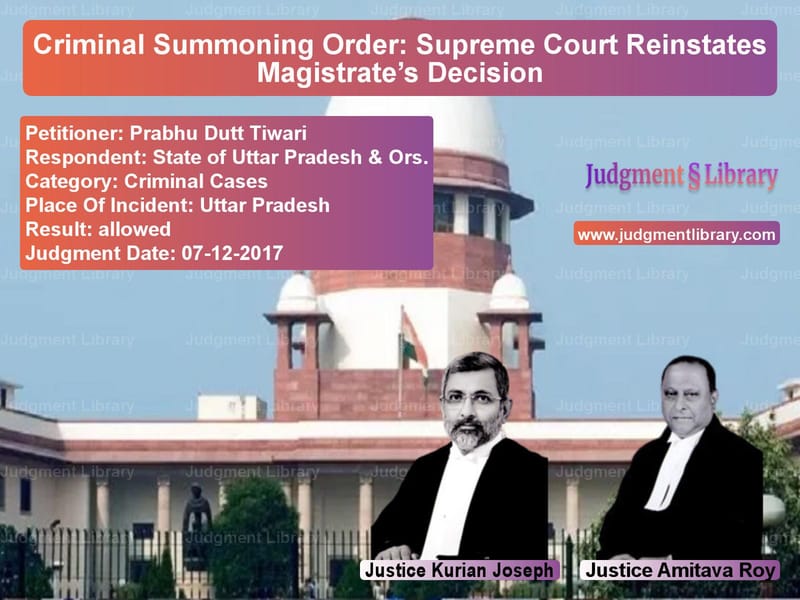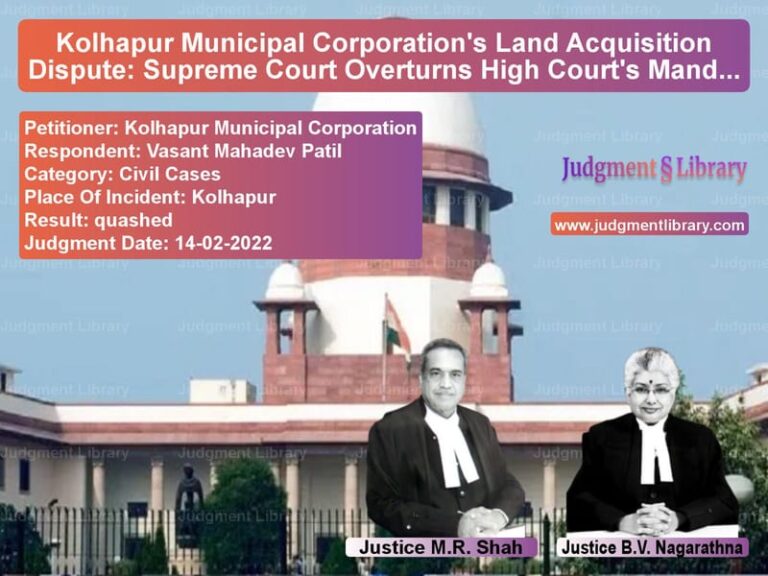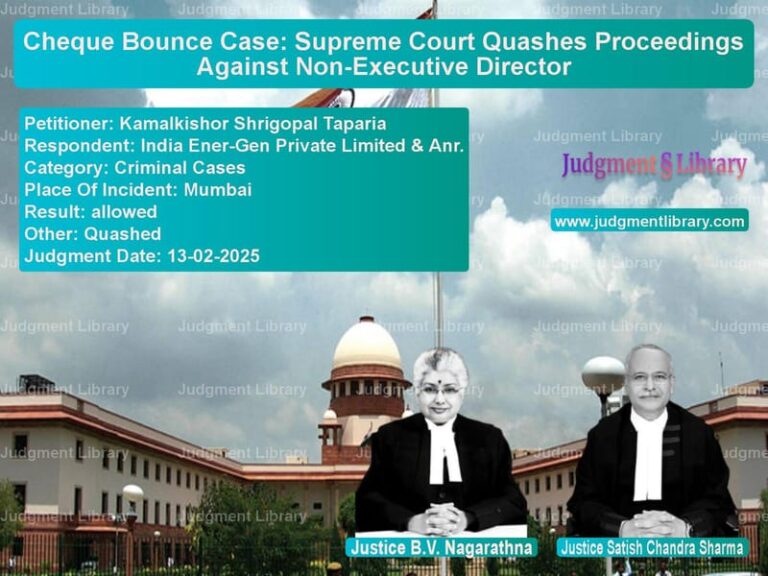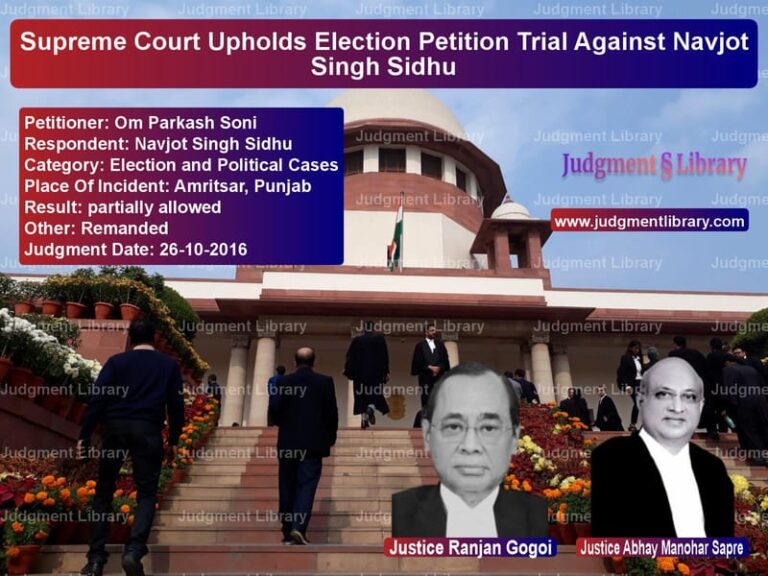Criminal Summoning Order: Supreme Court Reinstates Magistrate’s Decision
The Supreme Court of India recently ruled in favor of a complainant in a criminal case, reinstating a summoning order that had been quashed by the Allahabad High Court. The judgment in Prabhu Dutt Tiwari vs. State of Uttar Pradesh & Ors. reaffirmed the principle that at the stage of summoning, a Magistrate needs only to be satisfied that there is sufficient ground to proceed against the accused.
Background of the Case
The case originated from a criminal complaint filed by the appellant, Prabhu Dutt Tiwari, in which he accused several individuals of fraudulently obtaining a registered deed for his ancestral land. The complaint alleged that the accused had used threats and coercion to secure the transfer of the property.
The Additional Chief Judicial Magistrate, Deoria, after considering the evidence, issued a summoning order against five accused persons under Sections 419, 420, 468, 471, and 120B of the Indian Penal Code (IPC). The accused challenged this order before the High Court, which quashed the summoning order, stating that the complaint did not establish a criminal offense and should be resolved through civil proceedings.
The complainant, dissatisfied with the High Court’s ruling, approached the Supreme Court.
Key Legal Issues
- Whether the High Court was justified in quashing the Magistrate’s summoning order at the initial stage.
- The extent of judicial interference permissible in summoning orders issued by lower courts.
- The distinction between civil and criminal liability in property disputes.
Arguments by the Parties
Appellant’s (Prabhu Dutt Tiwari) Arguments
- The Magistrate had sufficient grounds to summon the accused based on evidence provided during the preliminary inquiry.
- The High Court exceeded its jurisdiction by interfering in a summoning order that was validly issued.
- The fraud and coercion alleged in the complaint constituted clear criminal offenses, justifying criminal proceedings.
- The accused had used deceptive means to obtain a fraudulent sale deed, making the matter a fit case for prosecution under IPC provisions.
Respondents’ (Accused) Arguments
- The dispute was primarily a civil matter concerning property ownership and should not be pursued as a criminal case.
- The complainant failed to challenge the sale deed through appropriate civil litigation.
- The summoning order was issued without proper application of judicial mind and should be set aside.
High Court’s Observations
The High Court of Allahabad quashed the summoning order on the following grounds:
- The complainant did not challenge the bhumidhari rights of one of the accused, Mahima Tiwari.
- There was no documentary evidence proving that the sale property was ancestral or that the complainant had a birthright in it.
- If the complainant had any grievance, he should have pursued a civil suit for cancellation of the sale deed.
- The Magistrate was bound to consider whether the transaction was legally permissible before issuing the summoning order.
Supreme Court’s Observations
The Supreme Court, comprising Justices Kurian Joseph and Amitava Roy, overturned the High Court’s ruling and reinstated the summoning order. The Court held that:
On the Role of the Magistrate in Summoning Orders:
“At the stage of summoning the accused on the basis of a private complaint, all that is required is satisfaction by the Magistrate that there is sufficient ground to proceed against the accused.”
On the High Court’s Interference:
“The discussion by the High Court gives an indication that the Magistrate had to appreciate the evidence and then enter a finding as to whether the accused are guilty or not. This is not required at the stage of summoning.”
On the Nature of the Allegations:
“The allegations in the complaint, supported by statements and evidence, make out a prima facie case under Sections 419, 420, 468, 471, and 120B IPC.”
Final Judgment
The Supreme Court allowed the appeal and set aside the High Court’s order. It restored the Magistrate’s summoning order and directed the accused to appear before the trial court within one month. The Court also provided that:
- The accused shall be released on bail upon furnishing sufficient sureties to the satisfaction of the trial court.
- The judgment should not be seen as an expression of opinion on the merits of the case, and the accused could take all legal defenses at the appropriate stage.
Implications of the Judgment
For Criminal Complaints
- The ruling clarifies that at the summoning stage, the Magistrate’s role is limited to assessing whether there is a prima facie case.
- The ruling limits judicial interference by High Courts in summoning orders.
- Complainants have a stronger legal position when challenging fraudulent transactions.
For Civil vs. Criminal Disputes
- Property disputes involving fraud, coercion, or misrepresentation can be prosecuted as criminal offenses.
- Courts must distinguish between purely civil disputes and those that involve criminal conduct.
- Defendants cannot avoid criminal liability merely by claiming that the dispute is civil in nature.
Key Takeaways
- The Supreme Court reaffirmed that summoning orders should not be quashed unless there is a clear abuse of process.
- At the summoning stage, the Magistrate is not required to evaluate the merits of the case beyond a prima facie assessment.
- The ruling reinforces the principle that fraudulent transactions can be both civil and criminal matters.
- Accused persons must appear before the trial court and can only seek discharge at a later stage if there is insufficient evidence.
This landmark judgment strengthens the rights of complainants in criminal fraud cases and sets important guidelines for lower courts on issuing summoning orders.
Don’t miss out on the full details! Download the complete judgment in PDF format below and gain valuable insights instantly!
Download Judgment: Prabhu Dutt Tiwari vs State of Uttar Prade Supreme Court of India Judgment Dated 07-12-2017.pdf
Direct Downlaod Judgment: Direct downlaod this Judgment
See all petitions in Fraud and Forgery
See all petitions in Landlord-Tenant Disputes
See all petitions in Attempt to Murder Cases
See all petitions in Judgment by Kurian Joseph
See all petitions in Judgment by Amitava Roy
See all petitions in allowed
See all petitions in supreme court of India judgments December 2017
See all petitions in 2017 judgments
See all posts in Criminal Cases Category
See all allowed petitions in Criminal Cases Category
See all Dismissed petitions in Criminal Cases Category
See all partially allowed petitions in Criminal Cases Category







